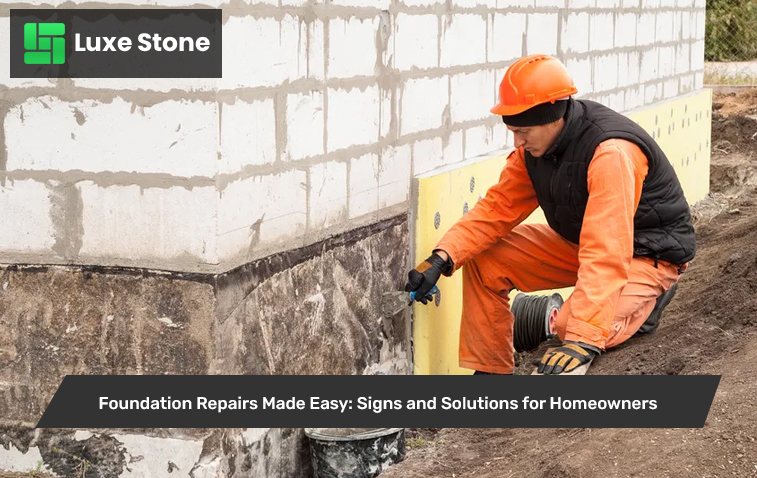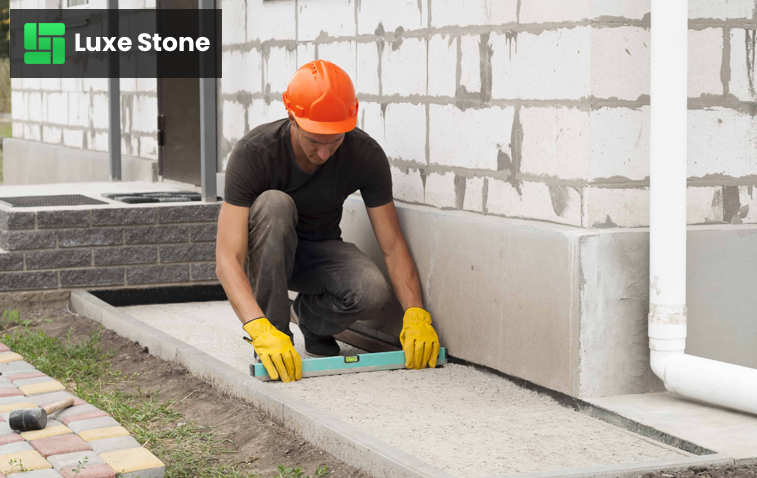Foundation Repairs Made Easy: Signs and Solutions for Homeowners
The foundation is like the house’s feet. It holds the whole house up. If the foundation has problems, the whole house can have problems too. So, it’s super important to keep an eye on it. This helps keep our houses safe and strong. This information makes sure everyone can live in a strong house. So, let’s learn about house foundations!

Signs of Foundation Problems
First, let’s talk about how we can tell if a foundation has problems. There are some easy things we can look for. These are like clues that the house gives us.
- Cracks in Walls and Floors: Sometimes, we see cracks in the walls inside our house. These cracks can be big or small. They can go across the wall or up and down. Similarly, we might see cracks in the floor. These cracks are a big clue. They tell us that the foundation might be moving. For example, if the ground under the house shifts, it can make the foundation move. Consequently, this movement causes cracks in the walls and floors. Therefore, it is important to check for cracks.
- Doors and Windows That Stick: Another thing we can look for is doors and windows that are hard to open or close. For instance, if a door rubs against the frame, it might be a foundation problem. Likewise, if a window is hard to lock, it could mean the same thing. This happens because when the foundation moves, it can change the shape of the door and window frames. As a result, they don’t fit properly. This is another important sign.
- Uneven Floors: Sometimes, the floors in our house might feel slanted or uneven. For instance, if a ball rolls across the floor by itself, it means the floor is not level. This is a very clear sign of foundation problems. Because the foundation is what holds the floor up, if it sinks or shifts in one area, the floor will become uneven. Therefore, we should check for uneven floors.
Solutions for Foundation Problems
Now, let’s talk about how we can fix foundation problems. There are different ways to do this, depending on the problem.
- Slab Jacking: If a part of the concrete slab foundation sinks, we can use a method called slab jacking. In this process, special material is pumped under the slab. This material lifts the slab back to its original position. This is like giving the house a little boost. After that, the house is level again. This is a good way to fix sunken slabs.
- Piering: Sometimes, the foundation needs extra support. In this case, workers can install piers. Piers are like strong posts that go deep into the ground. These piers support the foundation and stop it from sinking further. Additionally, they can even lift the foundation back up a little bit. For example, if the soil under the house is weak, piers can help. Therefore, piers are a good solution.
- Drainage Improvements: Water can be a big problem for foundations. If water collects around the foundation, it can cause the soil to expand and put pressure on the foundation. To prevent this, we can improve the drainage around the house. For example, we can install gutters and downspouts to direct water away from the house. Furthermore, we can slope the ground away from the foundation. This helps keep water away and protects the foundation.
Preventing Foundation Problems
It’s always better to prevent problems before they happen. Here are some things we can do to keep our foundation healthy.
- Proper Drainage: As we just learned, keeping water away from the foundation is very important. Therefore, make sure your gutters and downspouts are working correctly. Also, make sure the ground slopes away from your house. This will help water flow away and not pool around the foundation. Consequently, this protects the foundation.
- Maintaining Consistent Moisture Levels: Changes in soil moisture can cause problems. For instance, dry soil can shrink, and wet soil can expand. These changes can put stress on the foundation. Consequently, it’s important to keep the soil around the foundation at a consistent moisture level. This can be done by watering during dry periods and making sure water drains away properly.
- Regular Inspections: Finally, it’s a good idea to have your foundation inspected regularly by a professional contractor. They can spot problems early on and recommend the best solutions. This is like going to the doctor for a checkup. It helps catch problems before they become big.
Many things cause foundation settling. For example, soil type plays a big role. Clay soil expands when wet and shrinks when dry. This movement puts stress on the foundation. Also, poor drainage can cause water to pool around the foundation. This can soften the soil and cause settling. Additionally, tree roots near the foundation can absorb moisture from the soil.
Some cracks are just cosmetic and not a big deal. However, some cracks can indicate serious foundation problems. For instance, horizontal cracks or stair-step cracks in brick walls are often signs of foundation movement. Also, cracks that are wider than a quarter of an inch should be checked by a professional.
A stable foundation is crucial for a safe and comfortable home. For example, it prevents structural problems like cracked walls, uneven floors, and sticking doors and windows. Also, it helps maintain the value of your home. Additionally, it prevents water damage and pest infestations.
Poor drainage is a big problem for foundations. For example, when water pools around the foundation, it can saturate the soil. This causes the soil to expand and put pressure on the foundation walls. Also, this can lead to cracks, leaks, and even foundation failure.
Soil plays a very important role in foundation stability. For instance, different types of soil have different properties. Clay soil expands and contracts with moisture changes. Sandy soil drains well but doesn’t provide much support. Therefore, the type of soil under your house can greatly affect the foundation. Also, the soil’s ability to drain water affects how much pressure it puts on the foundation.
It’s a good idea to have your foundation inspected by a professional every few years. For instance, if you live in an area with expansive clay soil or frequent earthquakes, you might need more frequent inspections. Also, if you notice any signs of foundation problems, such as cracks or sticking doors, you should have it inspected right away.

